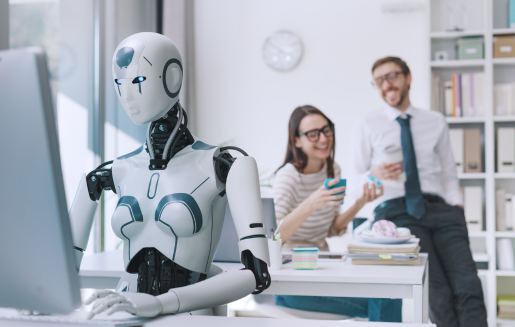How AI-Powered Digital Workers Unlock Intelligent Automation?

Imagine a workplace where the daily grind of repetitive tasks is taken over by systems that not only work 24/7 but also learn, adapt, and even offer insights to drive smarter decisions. This is the new reality of intelligent automation. AI-powered digital workers are emerging as true game changers. Today, they do more than just tick off checklists; they’re redefining the way we work and design business processes.
Currently, 75% of employees are using AI in their workplace. This shift isn’t incremental. It’s transformative. The traditional view of automation where machines simply follow predefined rules—is giving way to intelligent systems that understand context, make decisions, and collaborate with human teams.
The real question is: Are we ready to move beyond efficiency and embrace true intelligence at work?
From Automation to Intelligence: A New Era of Digital Workers
For decades, automation meant setting up systems to perform repetitive tasks with unwavering precision. Robotic Process Automation (RPA) did wonders by taking over routine work, but it was limited by strict rules. If something unexpected happened, the system would freeze. The world, however, is far too complex for static, rule-based processes.
Enter AI-powered digital workers who use AI and machine learning, learn from data, adapt, and improve constantly without oversight.
Digital workers push automation beyond RPA. They process unstructured data, make real-time decisions, and communicate naturally.
The shift is clear. We are entering a world beyond automation where systems engage and evolve.
The Hidden Superpower: How Digital Workers Sense, Analyze, and Act
Digital workers have a unique power. They sense, analyze, and act autonomously.
Adaptive Learning: Old bots need constant programming. But AI digital workers learn over time. They process data non-stop, evolve with every task, and improve accuracy as they go.
Natural Language Understanding: Communication drives business. With NLP, digital workers read, interpret, and generate human-like language. They handle customer queries, draft reports, and grasp context.
Cognitive Decision-Making: Digital workers analyze vast data sets. They make decisions once reserved for humans. They assess financial risks. They personalize customer experiences. They optimize operations.
Seamless Integration: Intelligent automation must not work in silos. Digital workers integrate smoothly with enterprise systems. They connect business functions. They ensure seamless workflows.
Across industries, digital workers excel. In finance, they underwrite loans and detect fraud in seconds. In healthcare, they manage patient data and process claims with accuracy. In customer service, they transform basic interactions into meaningful experiences.
Business Impact: Redefining Efficiency and Strategy
Intelligent automation does more than boost speed and accuracy. It reshapes businesses at every level.
Orchestrating Intelligent Workflows: Digital workers automate entire processes, not just tasks. In finance, they link fraud detection, invoice processing, and reporting. In retail, they manage inventory dynamically, responding to demand in real-time.
Enhancing Decision-Making: Digital workers do not just collect data. They interpret it. They analyze emails, reports, and social media. They deliver insights and help businesses predict customer behavior. They optimize supply chains and also identify trends before they emerge.
Cost Competitiveness: Automation cuts costs. Intelligent automation amplifies savings. It reduces errors. It minimizes manual oversight. It accelerates processes. Companies become leaner, faster, and more agile.
Rethinking Human Capital: The belief that AI replaces jobs is outdated. Digital workers redefine roles freeing up humans to focus on innovation, creativity, and strategy. It is not man versus machine. It is a collaborative approach.
The Digital Worker Economy: Building a New Corporate Infrastructure
In the emerging era of intelligent automation, AI-powered digital workers are more than just operational tools, they are strategic assets. They demand a shift in how organizations plan, invest, and measure success.
Investment: Powering a smart digital workforce is an ongoing process. This requires not only technology investment, but also development and continuing training. The systems must be nurtured, as you would with any other valuable asset in your company.
Measurement: Classic metrics may not be sufficient when quantifying the impact of intelligent automation. New KPIs must be created—ones that reflect the synergy between machine accuracy and human creativity. This means measuring results like enhanced decision quality, faster response speed, and higher innovation levels.
Integration: The true power of intelligent automation resides in its ability to make work flow smoothly throughout the enterprise as a whole. The digital workers must be integrated deeply within the corporate ecosystem, all the way from front-end customer interactions to back-end operational workflows. If that’s the case, you’re not automating a process; you’re transforming it.
Companies mastering this shift gain operational efficiency and strategic agility. They pivot fast. They adapt to market changes. They drive innovation at every level.
The Future of Work: Embracing Human-AI Collaboration
The future of work is a collaborative environment where digital workers amplify human potential. This isn’t about fearing technology, it’s about harnessing it as a trusted partner.
Picture an office where AI handles tedious tasks. Teams are free to brainstorm, innovate, and solve complex problems. AI and humans work side by side. Human skills—empathy, creativity, and ethical judgment, complement AI’s data-processing power.
To embrace this future, organizations must act now. They must redesign roles. They must train employees to work with AI. Governance frameworks must ensure ethical AI use. With the right approach, workplaces will empower employees with intelligent technology.
Conclusion
Intelligent automation is here. AI-powered digital workers are leading the revolution. They streamline workflows, enhance decision-making, and elevate human talent.
Organizations embracing this shift gain agility, efficiency, and innovation. Those clinging to outdated models fall behind. The key is mindset. Digital workers are not threats. They are essential partners in progress.
Partnering with AI automation experts accelerates success. Firms like Recode Solutions lead the way. They help businesses harness intelligent automation.
But the real catalyst is adaptation.
The question is no longer if AI-powered digital workers will reshape work. It is how fast businesses will adapt. The future is happening now. Are you ready to be a part of it?

